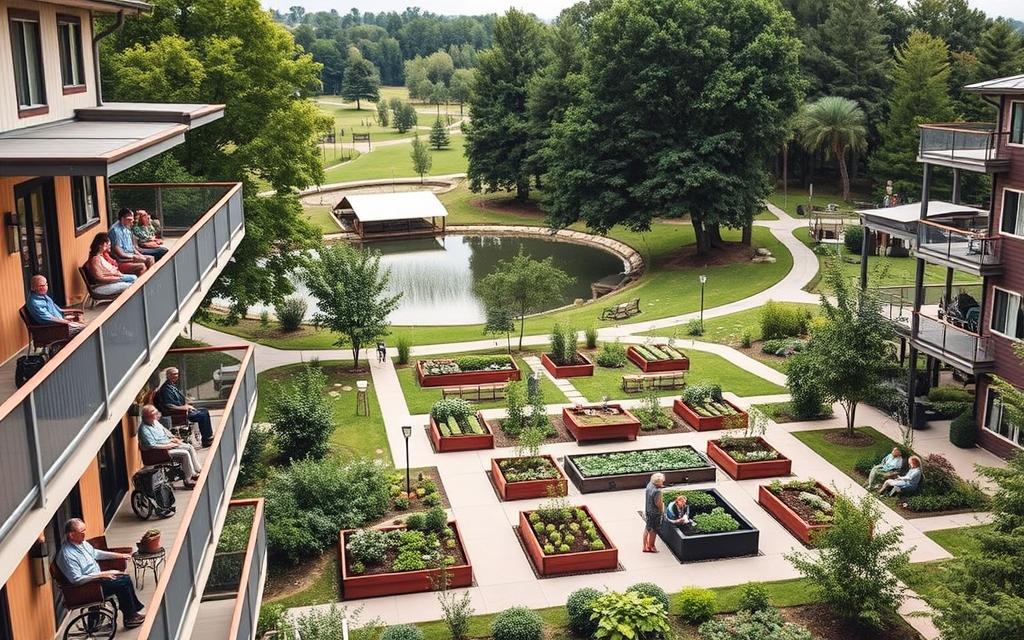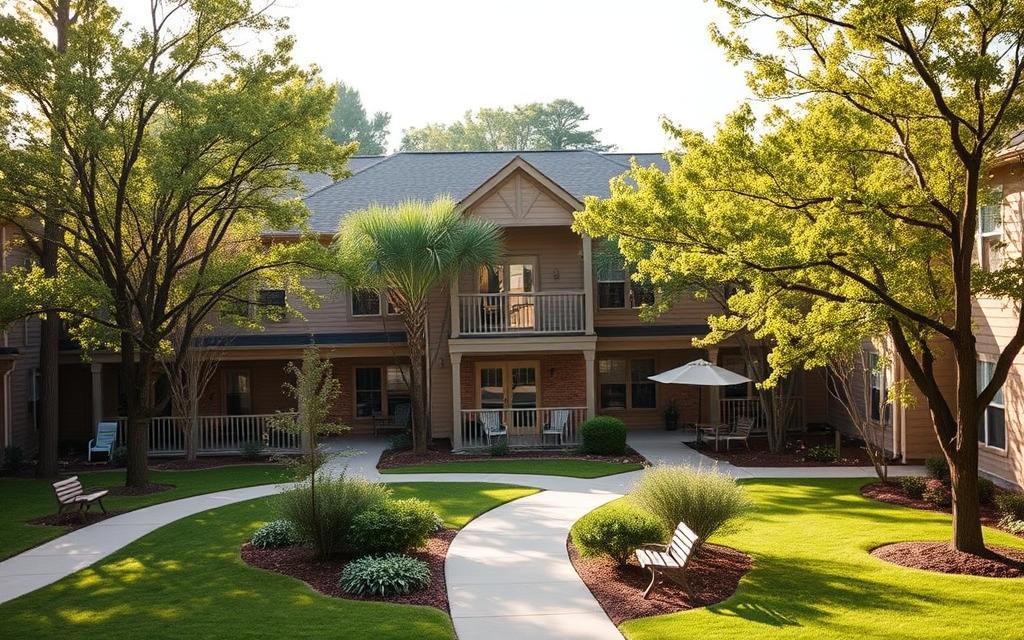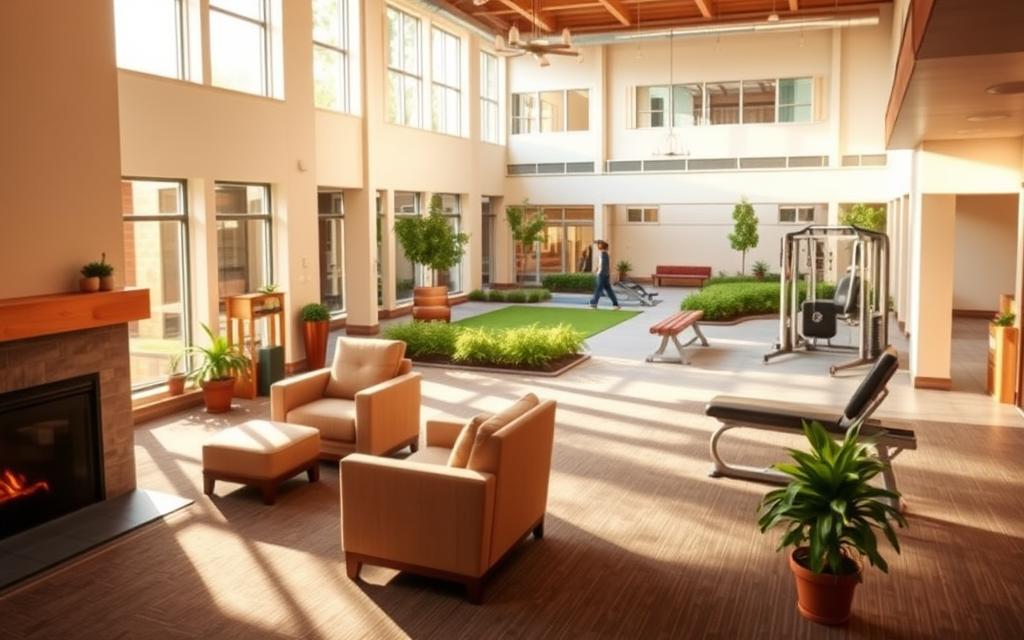Senior Citizen Housing Low Income Options
Are you or a loved one looking for senior citizen housing low income? You’re not alone. Many seniors find it hard to find safe and affordable homes. That’s why HUD’s affordable housing plans for 2025 are so important.
As we get older, our money situation often gets worse. This makes it tough to keep up with rising housing costs. HUD’s updates on family incomes and limits will change low-income housing for seniors. But what does this mean for you?
Knowing about HUD’s 2025 plans can help you in the complex world of senior citizen housing low income. By staying informed, you can make smart choices for your housing. This ensures a more secure financial future.
Key Takeaways
- HUD’s 2025 plans include updates on median family incomes and income limits.
- These updates will impact low-income housing programs for seniors.
- Understanding these changes is key for finding affordable housing.
- You can make informed decisions by staying up-to-date on HUD’s plans.
- Affordable housing options for seniors are out there. Knowing how to find them can really help.
The Growing Need for Affordable Housing Among America’s Seniors
More and more older adults need affordable housing. This is because they face money problems and don’t have many housing choices. As people get older, it’s key to have a safe and cozy place to live. But, many seniors find it hard to find such a place.
Financial Challenges Facing Older Adults on Limited Incomes
About 1 in 3 older adults in the U.S. earn less than 200% of the poverty level. This was about $29,160 a year for one person in 2025. With not much money, it’s hard for seniors to pay for housing, which keeps getting more expensive.
Many seniors have fixed incomes and can’t earn more. This makes it hard to pay for housing as prices go up. So, there’s a big need for affordable housing options that fit seniors’ budgets.
How Housing Insecurity Affects Senior Citizens’ Quality of Life
Housing insecurity really affects seniors’ lives. When they can’t afford housing, they might live in bad conditions or worry about being kicked out. This can make them stressed and anxious, and even hurt their health.
Also, not having stable housing can keep seniors from getting the help they need and from seeing friends. By making housing affordable, we can help seniors live better lives.
Senior Citizen Housing Low Income: Understanding Your Options in 2025
Finding senior housing that’s affordable can be tough. But, knowing what’s out there can really help. There are many affordable housing options for seniors, each with its own special features.

Types of Affordable Housing Available to Seniors
There are many types of affordable housing for seniors. You can pick from independent living communities or supportive housing. Independent living gives you privacy and freedom. Supportive housing offers more help with daily tasks.
Independent living is great for those who can live alone but like community perks. Supportive housing is for those needing daily help. It includes services like cleaning, cooking, and personal care.
Key Differences Between Independent Living and Supportive Housing
The big difference is the level of care. Independent living is for those who can do things on their own. Supportive housing is for those needing more help.
Think about your daily needs and health when choosing. If you need a lot of help, supportive housing is better. But, if you want to stay independent, independent living might be right for you.
Matching Housing Options to Your Unique Needs and Preferences
Finding the right housing means knowing what you need and want. Look at your budget, where you want to live, and how much care you need. Think about what’s important to you, like transportation or meal services.
HUD’s Section 202 Supportive Housing for the Elderly offers affordable housing with extra help. By understanding your options, you can choose what’s best for your life.
HUD’s Section 202 Supportive Housing for the Elderly Program
The Section 202 program helps low-income seniors find safe and affordable homes. It also offers support to help them live on their own. This is very important for seniors aged 62 or older who are struggling financially.
How Section 202 Helps Seniors Live Independently
Section 202 gives money to non-profits to build homes for very low-income elderly. It offers affordable housing and support services. This helps seniors stay independent.
It helps seniors deal with aging problems like health and mobility issues. This way, seniors can live happy and fulfilling lives.
On-Site Support Services That Enhance Daily Living
One great thing about Section 202 is the on-site support services. These services include:
- Help with daily tasks like bathing and dressing
- Meal prep and nutrition advice
- Transport to doctor visits and events
- Fun activities and community programs
These services improve seniors’ lives. They help seniors stay connected and healthy.

Success Stories: Transforming Lives Through Affordable Housing
Many seniors have been helped by Section 202. For example, a 75-year-old widow was facing homelessness. Thanks to Section 202, she got a safe and affordable home. She also got support to help her live independently again.
Stories like this show how much Section 202 can change a senior’s life. Affordable housing and support can make a big difference.
Navigating Public Housing Opportunities for Low-Income Seniors
Public housing is a big help for low-income seniors. It offers lower rent and a supportive community. Knowing how to use the system is key.
Working With Your Local Housing Authority
The first thing to do is contact your local housing authority. They handle senior-friendly housing and help with applications. You should ask about properties, who can apply, and waiting lists.
To get started:
- Find your local housing authority’s contact info online or in local directories.
- Call them to talk about your housing needs and if you qualify.
- Find out about the application process and what documents you need.
Understanding the “Pay 30 Percent of Adjusted Gross Income for Rent” Rule
Public housing has a great rent rule. You pay 30% of your income for rent. This makes housing affordable for low-income seniors.
| Adjusted Gross Income | Rent Calculation | Example Rent |
|---|---|---|
| $1,000/month | 30% of $1,000 | $300 |
| $800/month | 30% of $800 | $240 |
| $600/month | 30% of $600 | $180 |
Amenities and Community Support in Senior Public Housing
Senior public housing has many benefits. It offers amenities and community support to improve your life. You might find community centers, healthcare services, and social events.

Look at what amenities and services are important to you. Many places offer:
- On-site fitness centers and fun activities.
- Transport to healthcare and shopping.
- Social events and gatherings.
Knowing what’s available helps you choose the best place for you.
Housing Choice Vouchers: Creating Freedom in Your Housing Journey
The Housing Choice Voucher Program lets you pick housing that fits your needs. As an older adult, this program is very helpful. It helps you rent a home in the private market with a voucher.
How Section 8 Vouchers Work for Older Adults
Housing Choice Vouchers, also known as Section 8 vouchers, are run by local housing authorities. You pay 30-40% of your income for rent. The voucher pays the rest, making rent more affordable.
To start, apply to your local housing authority. If you’re eligible, you get a voucher. This voucher lets you look for different apartments.
Finding Senior-Friendly Apartments That Accept Vouchers
Look for apartments that are affordable and good for seniors. Look for places with laundry, elevators, and community spaces. You can find these by contacting local property managers or searching online.
Visiting apartments in person is a good idea. It lets you see the place and meet the landlord. Ask about services for seniors.
Overcoming Common Challenges in the Voucher Program
While the program has many benefits, there are challenges. Finding landlords who accept vouchers can be hard. Stay organized and keep trying. Keep records of your talks with landlords and housing authorities.
Many local groups help voucher holders. They can guide you in finding apartments and understanding your rights. Using these resources can help a lot.
Low-Income Housing Tax Credit Properties: A Hidden Gem for Seniors
Finding affordable housing can be hard for seniors. But, Low-Income Housing Tax Credit (LIHTC) properties are a great help. These places get tax credits to help build affordable homes.
Benefits of LIHTC Senior Living Communities
LIHTC senior living places have many good points. They offer affordable rent that’s based on what you can pay. This helps seniors keep their living costs down.
These places also have cool amenities like community spaces and fitness centers. Plus, they have staff to help you.
Living in these places helps seniors make friends. They get to be with people their age. This makes them feel part of a community.
Eligibility Requirements and Application Tips
To live in LIHTC places, you need to meet some rules. You must be at least 62 and make less money than the program says. This helps keep the rent low.
When you apply, have your papers ready. This includes proof of your income, age, and where you live. Being ready makes the process smoother.
What Makes These Communities Different from Other Options
LIHTC places are special because they focus on being affordable and having a community feel. They offer services that help older adults. This makes them different from other senior housing.
The application for LIHTC places is also easier. This makes it simpler for seniors to find a home.
Beyond Housing: Supportive Services That Help You Age in Place
Aging in place means more than just a home. It’s about having the right help for daily needs. When looking at senior housing, think about the services that can improve your life.
Many senior housing programs offer helpful services. These services help you stay independent. They can make a big difference in where you live.
Essential Personal Care Services for Bathing and Dressing
Personal care is key for seniors. It includes help with bathing, dressing, and grooming. This help lets you keep your dignity and stay in your home.
Key personal care services include:
- Assistance with bathing and showering
- Help with dressing and grooming
- Support with toileting and hygiene
Home Health, Rehabilitation, and Skilled Nursing Options
Seniors may need home health, rehab, or skilled nursing. Home health services include medical care at home. This can be for wound care, managing meds, and physical therapy.
Rehabilitation services help you get better after illness or surgery. Skilled nursing care is for those with serious health issues.
These services are important for your health and recovery. When looking at senior housing, ask about these services.
Financial Assistance Programs That Complement HUD Housing
HUD housing is just one part of the solution. Other financial assistance programs can help you keep housing affordable. As a low-income senior, you might be eligible for support that makes a big difference in your life.
Supplemental Security Income and Housing Affordability
Supplemental Security Income (SSI) is a federal program for disabled, blind, and elderly people. It helps those with limited income and resources. SSI can be a big help for seniors with housing costs.
To get SSI, you must be 65 or older, blind, or disabled. You also need to have very little income and resources. You can apply for SSI at your local Social Security Administration (SSA) office.
Utility Assistance Programs for Low-Income Older Adults
Utility bills can be a big expense for low-income seniors. Luckily, there are programs to help with utility costs. The Low-Income Home Energy Assistance Program (LIHEAP) helps with heating and cooling costs.
LIHEAP can help with energy bills and sometimes with home repairs. To qualify, you must meet income guidelines and other requirements. Contact your local LIHEAP office to see if you’re eligible.
Leveraging Home Equity While Maintaining Affordable Housing
Seniors who own homes can use home equity to help with housing costs. A reverse mortgage lets you borrow against your home’s equity without monthly payments.
Reverse mortgages can help with living expenses, including housing costs. But, it’s important to think carefully about reverse mortgages. Talk to a financial advisor or HUD-approved counselor to understand the pros and cons.
Exploring these financial assistance programs can help you keep housing affordable. This can improve your overall well-being.
Conclusion: Taking Action to Secure Your Housing Future
As a senior, finding affordable housing can be tough. But, there are HUD programs to help. They include Section 202 Supportive Housing and Housing Choice Vouchers.
These programs can help you find housing that fits your needs. Knowing what you need and how to apply is key. This way, you can make smart choices about where you live.
Look into public housing and Low-Income Housing Tax Credit Properties. They might be just what you need. If you need help, talk to your local housing authority or a HUD-approved counselor.
By using HUD programs, you can get stable, affordable housing. This means you can live comfortably and independently as you age.
Resources:



